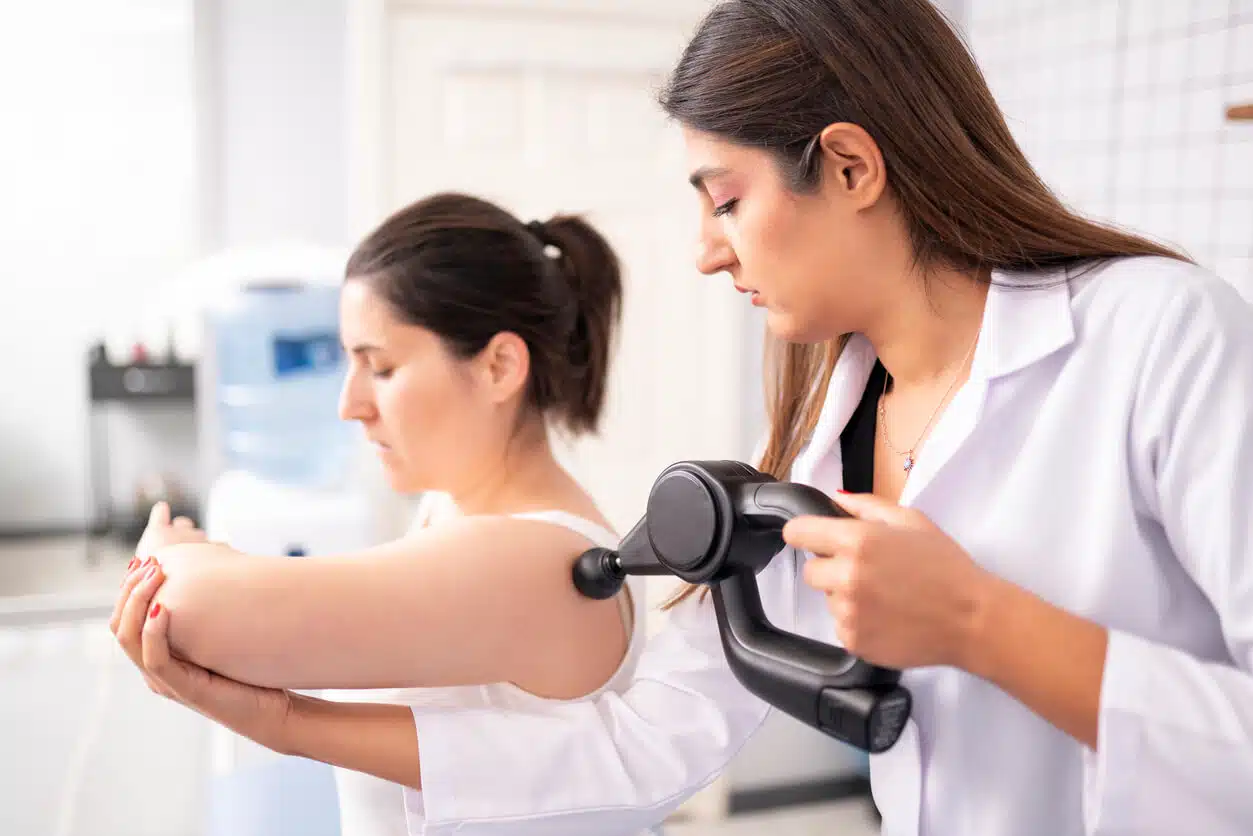
Rotator cuff tears can be very painful and limit the use of the affected arm and shoulder. If you make heavy use of your shoulder, whether it’s for sports or work, a tear can certainly prevent you from using it.
A rotator cuff tear is tearing to a tendon that supports the stability of the shoulder joint. It is a common injury in athletes such as baseball and tennis. It is also common in individuals with occupations that require repetitive overhead activities, such as assembly work or construction. However, this type of injury is also common in seniors due to age-related degeneration of the soft tissues in the shoulder.
Sometimes, surgery is the best option to repair rotator cuff tears. In some cases, particularly in partial-thickness tears, non-surgical management can help the shoulder tendon heal. In this article, we explore the non-surgical approaches used in managing rotator cuff tears.
The Role of Rest in Recovery
Rest is a fundamental component of non-surgical management for rotator cuff tears. By allowing the injured shoulder to rest, individuals minimize further stress on the affected tissues and reduce the likelihood of exacerbating the tear. Therefore, individuals may need to modify how they perform daily activities to reduce stress on the shoulder joint.
During the rest period, maintain gentle, pain-free movement to prevent joint stiffness and muscle atrophy. An orthopedic doctor can recommend specific activity modifications tailored to the individual’s condition, ensuring that the shoulder is given adequate time to heal. A gradual return to activities is a must to preserve the health of the tissue.
Medication for Rotator Cuff Tears
Medication taken orally can help manage rotator cuff tear symptoms and allow the individual to perform daily tasks.
#1 Nonsteroidal Anti-Inflammatory Drugs (NSAIDs)
NSAIDs such as ibuprofen and naproxen are commonly recommended to alleviate pain and reduce inflammation associated with rotator cuff tears. These medications provide symptomatic relief, allowing individuals to engage in physical therapy exercises and maintain functionality while the body’s natural healing processes take place.
However, it’s important to use NSAIDs cautiously and under medical supervision, as prolonged or excessive use may lead to gastrointestinal issues and potential interference with bone healing.
#2 Acetaminophen
Acetaminophen such as Tylenol is widely used as a first-line therapy for rotator cuff injuries due to its higher tolerability compared to other analgesics, such as NSAIDs. It is less likely to cause digestive issues and may be recommended to patients with a sensitive stomach.
#3 Prescription Pain Relievers
For stronger pain relief, doctors can prescribe certain medications. Just like any other medication, these are not designed for long-term use. They may also interact with other medications, so they should only be taken under the supervision of a physician.
Why Consult an Orthopedic Surgeon for Rotator Cuff Treatment
If shoulder symptoms persist, individuals should consult an orthopedic surgeon that specializes in rotator cuff tear treatment. Other non-surgical approaches that orthopedic surgeons can prescribe are cortisone injections and physical therapy.
#1 Corticosteroid Injections
Medication can also be delivered through an injection. For longer term pain relief from rotator cuff tear symptoms, corticosteroid injections may be prescribed by the orthopedic doctor. These injections deliver powerful anti-inflammatory medication directly into the shoulder, targeting inflammation and providing relief for the patient.
Corticosteroids are so effective at reducing swelling and pain, offering patients a window of opportunity to engage in rehabilitative exercises and gradually restore shoulder strength and function.
#2 Physical Therapy
Any type of treatment, whether non-surgical or surgical, can be combined with physical therapy. An individualized physical therapy program can help with relieving pain and inflammation and rebuilding strength in the shoulder. In many cases, physical therapy has helped patients avoid rotator cuff surgery.
Shoulder Arthroscopy
For complete tears, rotator cuff repair surgery is the best option. Orthopedic surgeons can now do this using a minimally invasive technique and smaller incisions, which means a shorter recovery period for patients. Shoulder arthroscopy to treat a rotator cuff tear is a very common surgery that can be used to treat various shoulder conditions.
Rotator Cuff Tear Treatments in North Dakota
The orthopedic surgeons at The Bone & Joint Center specialize in treatments of the shoulder. A rotator cuff tear is one of the most common injuries we expertly treat in our facilities. To determine the best approach, one of our orthopedic surgeons will thoroughly examine your shoulder and discuss your goals with you. Rest assured; our team of orthopedic specialists is committed to your recovery.
For any questions or to schedule an appointment, call us today at (701) 946-7400 / (866) 900-8650 or use our online request form. We look forward to assisting you in any of our locations in North Dakota.

